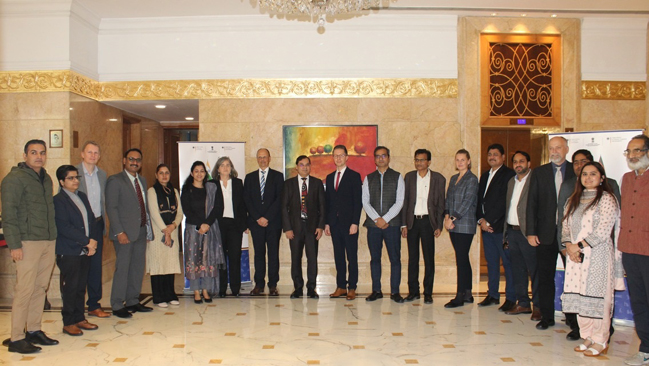
New Delhi, 8th December 2022.
To propel economic growth by empowering the youth with the right skills and providing them the access to right opportunities, 12th meeting of the Indo-German joint working group was held today in New Delhi to encourage Vocational Education and Training (VET). The deliberations at the meeting were aimed at institutionalizing a standard mechanism for VETto meet the skill requirements in priority sectors as per the German standards. A skill mapping exercise will be undertaken to assess the skill gaps and based on the same,bridge courses and upskilling programmes will be designedfor skill training of Indian workers.
Dr. KK Dwivedi, Joint Secretary, Ministry of Skill Development & Entrepreneurship, Government of India and Mr. Alexander Hochradel, Senior Policy Officer of division 222: ERASMUS; International Cooperation in Vocational Training, Federal Ministry of Education and Research (BMBF) co-chaired the meeting.
During the meeting, the two partner countries discussed on establishing a framework for employer connect and get an understanding on how skilledcertified workers could participate in economic development Mutual accreditation of training providers in both countries through G2G, G2B and B2B tie-ups with relevant institutions which have international standards for training, assessment, and certifications will also be undertaken
Federal Ministry of Education and Research (BMBF) and Federal Ministry for Economic Cooperation and Development (BMZ) discussed aggregation of demand requirements and employer mandates to NSDCI including job description, eligibility criteria, foreign language training and curricula details.BMBF and BMZ may also provide technical support for Training of Trainers (ToT), Trainers of Assessors (ToA), foreign language training, development of industry-relevant content and curriculum.
Shri Dr.
KK Dwivedi, Joint Secretary, Ministry of Skill Development &
Entrepreneurship, Government of India stated, Germany is one of India’s
most important partners in Europe owing to the strength of bilateral relations
that we have. And the deliberations that have taken place in today’s meeting
will further strengthen the ties between the two nations and will ensure that
we propel the economy by providing the right support and talent through vocational
education and training. There is great potential for workforce mobility from
India to Germany. The fact that almost one-third of Germany's Blue Card
recipients in 2021 have hailed from India, is a testimony to the vast
complementarities which exist between the requirements of skills and talents in
Germany and the vast reservoir of young, educated, and skilled persons in
India, who can contribute positively to India´s multi-dimensional cooperation
with Germany.
“Apprenticeship
being one of the most sustainable models of skill development, India proposes
for virtual/physical exchange programmes in academic and vocational domain focused
on apprenticeship training where students will be able to earn while they
through on the job projects across both countries,” he further added.
Alexander Hochradel, Senior Policy Officer of division
222: ERASMUS; International Cooperation in Vocational Training, Federal
Ministry of Education and Research (BMBF)
said, India has an added advantage of large pool of young talent pool that has
the potential to meet the requirements of skilled manpower in our country for
various trades. Undoubtedly, VET has become paramount in today’s dynamic
ecosystem that has seen tremendous changes post the pandemic and skilled
manpower can only be the answer to address this change in today’s World of Work.
Under the current system of recently announced German Immigration Act,
recognition of the equivalence of professional qualifications is crucial for
bringing in synergies between two countries.
Further, it is envisioned to undertake mapping exercise of skill gaps in
the key sectors in Germany, basis which an action plan may be designed for
bridge courses for skill training of Indian Workforce for mobility to Germany.
Earlier India has collaborated with Germany on projects like Indo-German Vocational Education Training, SINADE, IGnITE (Indo- German Initiative for Technical Education), QualIndiaand iMOVEto boost overseas mobility of the Indians. Therefore, moving towards standard mechanism for skill gap mapping and global skill harmonization framework is significant to improve incomes of migrating workforce and remittance transfers.
BMBF has funded a complementary project on strengthening company models of dual VET in industrial clusters in Northern India through a bottom-up approach (SINADE). The aim of the project is to develop a corporate blueprint for dual vocational training that can be deployed to other clusters later on.
NSDCI has recently conducted study to analyseworkforce demand in 16 destination countries (2022-2027). Acute shortage of skilled workforce is poised to become the key challenge for Germany in the near future which highlights the need for global skill mapping to capitalize on the emerging trends in different industries. The demand for skilled workforce will be the most in manufacturing, healthcare,wholesale and retail, science and information technology and construction